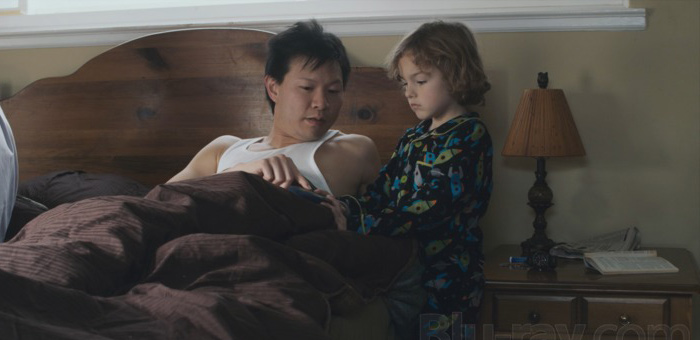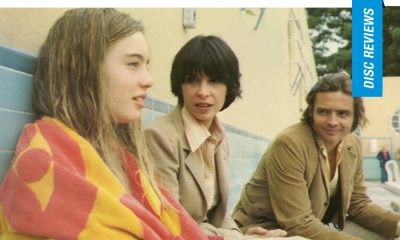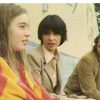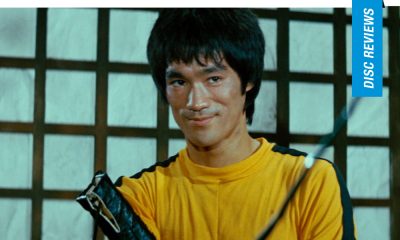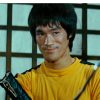Disc Reviews
In the Family | Blu-ray Review
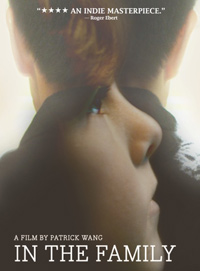 Not long after an initially unheralded premiere in 2011, the Independent Spirit Award nominated debut from Patrick Wang, In the Family, suddenly started getting much deserved attention, which resulted in a wider theatrical release in spring of 2012. The critical response has been nearly unanimous, and Wang stands as one of the most exciting new authorial voices in American indie cinema, not to mention his film’s ability to place an LGBT themed subject matter into a wider cinematic realm than the niche its ilk is usually relegated, has been an equally regal and transcendent.
Not long after an initially unheralded premiere in 2011, the Independent Spirit Award nominated debut from Patrick Wang, In the Family, suddenly started getting much deserved attention, which resulted in a wider theatrical release in spring of 2012. The critical response has been nearly unanimous, and Wang stands as one of the most exciting new authorial voices in American indie cinema, not to mention his film’s ability to place an LGBT themed subject matter into a wider cinematic realm than the niche its ilk is usually relegated, has been an equally regal and transcendent.
Chip (Sebastian Banes), wakes up one morning and bounces into his parents’ bedroom, waking up his dads, Joey (Patrick Wang), and Cody (Trevor St. John). We watch their breakfast ritual, as the three warmly and familiarly converse, all of them going about their respective days, Cody being a teacher and Joey a contractor. They have family friends, like Anne (Eisa Carter), and Cody’s sister Eileen (Kelly McAndrew) and her husband, Dave (Peter Robey), all who seem quiet comfortable with Cody and Joey in their small town community of Martin, Tennessee. Suddenly, Cody gets into a fatal car accident and Joey finds himself alone with Chip, who is not his biological son.
Through varying degrees of quiet flashbacks we learn that Cody was originally married to Chip’s mom, and Joey had been hired to build their new home. When Cody’s wife died in child birth, several months later, to his surprise, he found himself falling in love with Joey, and for the next five years, they built a happy life together for themselves and their young son. Slowly, it’s revealed that Cody’s family had some initial, if politely perceptible discomfort with Joey, including Cody’s mom Sally (Park Overall). But all politeness soon drains away when Eileen discovers Cody’s last will and testament, last updated when Chip was born, before he became involved with Joey. Since she’s named as the sole inheritor of Cody’s house and guardianship of Cody’s son, conflict quickly arises. That Thanksgiving, the Hines family asks that Joey quietly drop Chip off to celebrate the holidays and when he returns to get his son he finds that Eileen has absconded with Chip, eventually leading to her obtaining a restraining order. As Joey struggles futilely to find a lawyer that will argue his case, he’s perpetually stonewalled by an uncaring community.
Continuing on with his work, Joey has been working on a home for a retired attorney, Paul Hawks (Brian Murray) who has an extensive law library. Joey mentions he can rebind some of his well work book collection (a skill he had learned from his foster father), and as the two men speak, Hawks decides to help Joey, claiming that there may not be help from the law, but perhaps they can appeal to Eileen and Dave as humans.
There’s a palpable and discernable dread and discomfort threaded throughout In the Family, perhaps more resonant for those who know the drill. Here we have a gay Asian American man in a small, Southern community, daring to struggle to raise the young child of his deceased partner, and somehow, Wang, while introducing all of these labels and details, strips all of those layers away to make this simply the story about a parent trying to care for his child. There’s still considerable discomfort here, with Wang’s realistic performance striking a resonant awkwardness with familiar situations, trying to explain the exact nature of his relationship with Cody through implication, which causes trouble when trying to see Cody after surgery in the hospital, or explaining to lawyers that Chip has two fathers. The words gay or homosexual are never uttered in In the Family, and the film sort of employs tactics of first wave queer theory as we experience with Joey a constant and continual coming out experience with nearly every interaction outside of the familial or familiar, which succinctly embodies Sedgwick’s Epistemology of the Closet.
As a filmmaker, Wang proves himself to be a master storyteller and director right out of the gate, the running time of In the Family just under two hours, and nary a false note in sight. Filled with long takes and static shot compositions, there’s a definite arthouse aesthetic to the film, but the film more than compensates for its massive running time to convey such a simple narrative.
This is an exercise in observation, where we get comfortable with our protagonist, a thrice removed outsider, continually shown to us as residing outside his element. We are continually shown the back of his head, the environment navigating around and in front of him, yet we’re reminded he doesn’t quite blend into the mix. A static camera from a scene early on in Joey and Cody’s kitchen shows the three of them getting ready for the day together. After Cody’s death, we get the same establishing shot without Cody, a long take with no dialogue where Chip and Joey wordlessly comfort one another, until, Joey finally getts up to clear that morning’s breakfast dishes, which had been set for three.
Wang has assembled a beautifully low key cast, with some seasoned character actors like Murray, delightful new talents like McAndrews, and even some notable alums, like an almost unrecognizable Park Overall, and made a quietly beautiful film about family.
Disc Review
Released from In the Family LLC is this beautifully packaged Blu-ray edition of the film. Stuffed with video essays from notable admirers of the film’s graceful artistry (and a booklet of additional essays as well), a behind the scenes video montage is also included.
Video Essay: Simple Expressions of Absolute Value
Kevin B. Lee discusses Wang’s use of race and space, claiming that the film is an excellent example of provocation in the guise of a portrayal. Lee points out that the film is uncommon in its uninterrupted sense of space and time, comparing the number of shots to other films (In the Family contains 280 shots in its 165 minute running time, while something like Lincoln contains the same amount of shots in its first 50 minutes).
Video Essay: The Mirror of Nature
H.P. Mendoza discusses how Wang breaks rules of filmmaking by instead adhering to rules of human empathy. He discusses reactions to the film’s screening in San Francisco while he was a moderator.
Video Essay: Tour of the Cutting Room Floor & Sculpting a Scene
Wang himself discusses what scenes were cut and why, and uses several sequences to show how he eventually crafted them into the final product.
Behind the Scenes
Since there were no behinds the scenes camera used on the set so as not to interrupt the intimacy of the material, we get a montage of auditions and other bits and pieces of interest.
Final Thoughts
In the Family, if anything, is a testament not only to the power of positive word of mouth (and critical praise), but the interest and hunger for characters like the ones Wang portrays here, and a type of cinema that is as humanistic as it is artistically engaging. The film will go on to capture an even wider audience with this beautiful and lovingly handled DVD package, hopefully to be as enthusiastically received by audiences for years to come, even as the social landscape within which its set starts to drastically change. In the Family exemplifies the power of the moving image, a quiet instance of bringing people together from different avenues.



